Thoughts on the Alt-Right: The Republican Party of Reagan is Dead!
When I got out of high school, I identified as a Republican. For a short period of time, I even wrote propaganda pieces arguing for the cause of the Republican Party. Needless to say, my views have changed. I am no longer a Republican, but neither am I a Democrat. My current political views are based on the ideas of Thomas Paine, as espoused in Agrarian Justice, and Henry George, as espoused in Progress and Poverty, and heavily influenced by the ideas of Thomas Jefferson as well. The ideas of the American founding fathers are not even remotely compatible with the positions of the Republican Party, either then or now—and the Republican Party was much different back then. At the present moment, I would regard myself as an anti-racist social democrat with left-libertarian and Georgist influence.
My Intellectual Genealogy
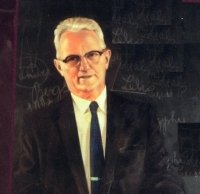
I started off as a somewhat party-line Republican in 2008, but leaning a little further to the right. I was a Christian. I followed C. S. Lewis, but also liked Dinesh D'Souza and Ravi Zacharias. By 2010, I had joined the Austrian School of economics and gotten into Christian fundamentalism. I had transitioned from ordinary conservatism to austro-libertarianism. I studied the works of fundamentalists like Cornelius van Til, R. J. Rushdoony, Greg Bahnsen, and John Frame. Gary North and R. J. Rushdoony basically represented the intersection of austro-libertarianism and Christian fundamentalism. They advocated theonomy or reconstructionism, which sought to reinstate biblical law as the law of the land. I did not wholeheartedly subscribe to the views of any of these thinkers.
I had studied Eastern Orthodoxy and was totally convinced that Eastern Orthodoxy was the one true religion, which kept me from jumping completely on the fundamentalist bandwagon. However, I applied Van Til's presuppositionalist approach to apologetics and was convinced that I could thoroughly refute any non-Christian worldview; and Christianity was synonymous with Eastern Orthodoxy in my estimation. The austo-libertarian influence got me to jump on the Ron Paul bandwagon. I also read works by Murray Rothbard, which got me into "anarcho-capitalism," although I never really identified as an "anarcho-capitalist" in any sense that meant anything other than market-anarchism. Eastern Orthodoxy basically requires one to be a distributist and communalist, so the pure Rothbardian position was unacceptable to me. Since I was a firm believer in Eastern Orthodoxy, I attempted to synthesize libertarianism and distributism, using the term libertarian distributism to describe my personal fusion of anarcho-capitalism and distributism. (Technically, combining market-anarchism with distributism made my libertarian distributism a variety of left-libertarian mutualism rather than anarcho-capitalism. I rejected capitalistic property in favor of usufructuary property.) I also tried to reinterpret theonomy in a more libertarian fashion that might be more compatible with Orthodoxy—this involved reinterpreting biblical laws in the light of New Testament passages in such a way as to avoid having to advocate the death penalty for adultery, sodomy, etc.
The Rise of the Alt-Right
I have laid out my own intellectual genealogy for a reason. These fringe movements—fundamentalism, austro-libertarianism, reconstructionism, theonomy, etc.—basically constituted the alternative right, the fringe of the American right. These were the sorts of movements that would ultimately coalesce into the Alt-Right and lead to the Trump phenomenon. By 2012, I was already warning against the dangers of Mitt Romney, Michele Bachmann, and Sarah Palin, who had links to theonomy and some of the more unsettling elements of the fringe right. I noticed the emergence of what I was then referring to as "austro-fascism." I saw people like Christopher Cantwell taking some of the ideas of the Austrian School in a different direction, a very anti-libertarian direction. I saw the fringe elements of the right taking things in a direction that I didn't like. At the time, I was still a Christian presuppositionalist and a libertarian within the Austrian School. I warned that people like Stephan Molyneux, Lew Rockwell, and Christopher Cantwell were taking austro-libertarianism in a fascist direction. They started with a Rothbardian anarcho-capitalist framework and morphed it into a justification for fascism. All three of these popular "anarcho-capitalist" theorists ended up endorsing Donald Trump for president. Cantwell now openly identifies as a "fascist," and flies a black and yellow "anarcho-capitalist" flag with a swastika on it. He was also one of the organizers of the Unite the Right rally in Charlottesville, where white supremacists carried torches through the city, opened fire on unarmed counter-protesters, jumped and beat black people, and even murdered at least one counter-protester.
DIALECTICAL ANARCHO-CAPITALISM: MAKING LIBERTARIANISM FASCIST
There was a sort of intellectual sophistry or sleight of hand by which supposedly libertarian theorists could justify fascist and authoritarian policies. Dialectics encourages one to look at the results of a policy in the context of the overall existing system, to see whether the policy resembles what society would be like if you were to have your ideal system in place. If a policy that is not formally compatible with anarcho-capitalism happens to have results that are isomorphic to what you would see under anarcho-capitalism, then that policy can be regarded as functionally compatible with anarcho-capitalism. Thus, Lew Rockwell imagined his ideal "anarcho-capitalist" society, where the State has been totally privatized. In Rockwell's opinion, a government policy can be viewed as justified if it approximates his understanding of what would happen in an "anarcho-capitalist" system. Under anarcho-capitalism, there would be privatized police forces called "Private Defense Agencies" or "Rights Enforcement Agencies." Imagine replacing police forces with a bunch of competing thugs-for-hire companies like the Pinkertons. Such private police forces would do the bidding of whoever pays them. These private police would do the bidding of the capitalists and property owners under anarcho-capitalism. Thus, insofar as the function of police under actually existing capitalism is to protect proprietors and capitalists, this dialectical approach of Rockwell and his ilk can be used to justify a pro-police stance. Additionally, Rockwell has come out as anti-immigration as a result of this dialectical approach. According to Rockwell, all land would be privately owned under anarcho-capitalism. Consequently, one would not have the right to freely travel. With all land monopolized by private individuals, you would effectively have a closed border, according to Rockwell. Rothbard himself once made the case that libertarians ought to compromise with advocates of state's rights since leaving matters up to the states would actually lead to something more like the polycentric law that would emerge under a system of private courts within an anarcho-capitalist system. This dialectical Rothbardian approach led to many anarcho-capitalists becoming Trump supporters.
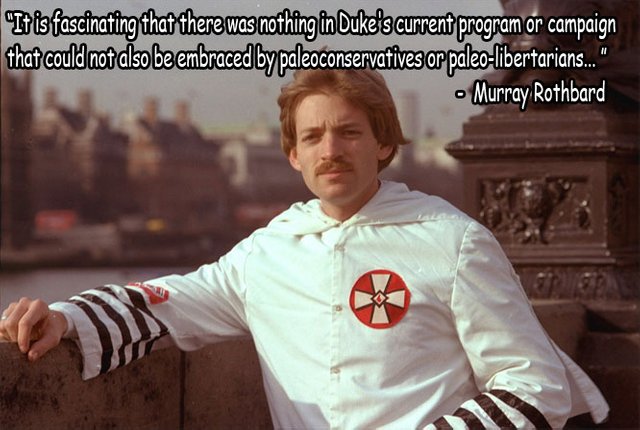
In some sense, this dialectical Rothbardianism—or austro-fascism, dialectical anarcho-capitalism, or whatever you want to call it—is a distortion of genuine individualist anarchism. However, it is also very much in line with classical anarcho-capitalism and would probably be embraced by Murray Rothbard, the founder of anarcho-capitalism, if he were alive today. Rothbard was a fan of the right-wing populist and klansman David Duke. In the early 1990s, Murray Rothbard started promoting things that kind of align more with this new austro-fascist movement than with classical anarcho-capitalism. In 1992, Rothbard published Right-Wing Populism: A Strategy for the Paleo Movement, where he praised David Duke and laid out a platform for right-wing populism. Rothbard's populist platform was actually remarkably similar to the platform that Trump ran on. Rothbard writes:
"A RIGHT-WING POPULIST PROGRAM
"A right-wing populist program, then, must concentrate on dismantling the crucial existing areas of State and elite rule.... In short:
"l. Slash Taxes. All taxes, sales, business, property, etc....
"2. Slash Welfare. Get rid of underclass rule by abolishing the welfare system, or, short of abolition, severely cutting and restricting it.
"3. Abolish Racial or Group Privileges. Abolish affirmative action, set aside racial quotas, etc., and point out that the root of such quotas is the entire “civil rights” structure, which tramples on the property rights of every American.
"4. Take Back the Streets: Crush Criminals. And by this I mean, of course, not “white collar criminals” or “inside traders” but violent street criminals – robbers, muggers, rapists, murderers. Cops must be unleashed, and allowed to administer instant punishment....
"5. Take Back the Streets: Get Rid of the Bums. Again: unleash the cops to clear the streets of bums and vagrants. Where will they go? Who cares? Hopefully, they will disappear, that is, move from the ranks of the petted and cosseted bum class to the ranks of the productive members of society....
"7. America First. A key point, and not meant to be seventh in priority. The American economy is not only in recession; it is stagnating. The average family is worse off now than it was two decades ago. Come home America. Stop supporting bums abroad... Stop gloabaloney, and let’s solve our problems at home.
"8. Defend Family Values. Which means, get the State out of the family, and replace State control with parental control. In the long run, this means ending public schools, and replacing them with private schools....
"Further: We must reject once and for all the left-libertarian view that all government-operated resources must be cesspools. We must try, short of ultimate privatization, to operate government facilities in a manner most conducive to a business....
"So far: every one of these right-wing populist programs is totally consistent with a hard-core libertarian position. But all real-world politics is coalition politics, and there are other areas where libertarians might well compromise with their paleo or traditionalist or other partners in a populist coalition. For example, on family values, take such vexed problems as pornography, prostitution, or abortion. Here, pro-legalization and pro-choice libertarians should be willing to compromise on a decentralist stance; that is, to end the tyranny of the federal courts, and to leave these problems up to states and better yet, localities and neighborhoods, that is, to “community standards.” "(Murray Rothbard, Right-Wing Populism: A Strategy for the Paleo Movement)
Anarcho-capitalism has a long history of coziness with racists, even before the rise of the Alt-Right. Rothbard made alliances across the right. He networked with white supremacists and nationalists, as well as with paleo-conservatives and more traditional libertarians. Rothbard also wrote books and articles in the realm of revisionist history, defending the Confederacy and claiming that the South was justified in its actions during the Civil War. Rothbard wrote works that accused Abraham Lincoln of being a racist. Of course, this neo-confederate revisionist history was really just racist propaganda, a way for Rothbard to make white supremacists feel welcome in the libertarian community. This revisionist history takes certain historical facts out of context and twists them in order to make it seem as if Lincoln were not opposed to slavery at all and that the South was really in the right all along. I have refuted these claims here and here.
THE DIFFERENCE BETWEEN AUSTRO-FASCISM AND RICHARD SPENCER'S PHILOSOPHY
This dialectical Rothbardian—AnCap-to-Nazi—faction of the Alt-Right is quite different from the faction represented by Richard Spencer. Richard Spencer's politics is not based in libertarian theory at all. Spencer advocates something more like ethno-nationalism combined with the Nordic model of social democracy—he's basically what Bernie Sanders would be if Sanders were a white supremacist. Richard Spencer supports single-payer healthcare (a policy that Trump has actually supported as well). Spencer also supports welfare programs and even universal basic income. Superficially, Richard Spencer supports a lot of the same left-wing policies that I currently advocate, but Spencer puts a very malicious twist on it. Spencer supports welfare, universal healthcare, and universal basic income but only for all white people. Spencer believes that racial minorities ought to be excluded from any social benefits. Spencer also advocates "peaceful genocide." Richard Spencer finds common ground with the austro-fascists and other fringe right-wing groups in their opposition to civil rights legislation. He can even get behind cutting welfare because he recognizes that many of the benefits go to black families and he opposes welfare for minorities. He supports the same policies for different reasons.

The term Alt-Right is a catchall phrase for the various fringe movements on the right. These movements found common ground in such things as wanting to repeal civil rights legislation, ban immigrants, and allow cops more leeway to just execute people that the right dislikes. The various factions in the Alt-Right have united because they see common ground on certain issues. They all support similar policies, but for very different reasons. Steve Bannon—the Alt-Right activist that was the former chairman of Breitbart News and served for a while as Donald Trump's chief strategist in the White House—supports slashing taxes, just like dialectical Rothbardians and anarcho-capitalists do, but for very different reasons. The Rothbardians think that taxation is inherently wrong. Bannon, however, does not. Instead, he thinks that cutting taxes and welfare will lead to chaos and could cause the whole system to collapse, making it possible for the Alt-Right to take control. Steve Bannon admires Vladimir Lenin and has described himself as a "Leninist." He rejects Marxism but supports Leninist political tactics. He basically supports Lenin-style tactics to lead to the collapse of the State, which he believes would create a power vacuum and allow the Alt-Right to take over. (It could easily be argued, though, that Bannon doesn't understand Leninism.)
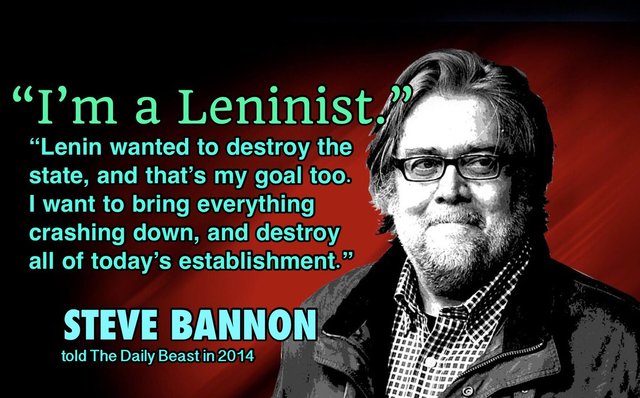
The Alt-Right is not an ideology in the sense that Marxism, anarchism, conservatism, liberalism, or libertarianism might be considered ideologies. There is no unifying ideology. Instead, the Alt-Right is a movement, made up of many different ideological factions that have agreed upon certain common goals. What "unites the right" is racism, anti-immigrant sentiment, homophobia, and a populist platform that expresses that bigotry. Such a right-wing populist platform was put forth by Rothbard in 1992 and ultimately picked up by Donald Trump when he ran for president in 2016.
Rothbardians have a long history of alliances with various fringe movements. Back in the 1960s, Rothbard made alliances with the New Left, anti-racists, and anarcho-syndicalists. Karl Hess, who coined the term "anarcho-capitalism" in reference to his close friend Rothbard's views, actually even worked at Murray Bookchin's Institute for Social Ecology for quite a while. In the 1970s, Murray Rothbard and Murray Bookchin both spoke at a Libertarian Party conference, trying to bridge the gap between market anarchism and social anarchism—the founder of anarcho-capitalism speaking alongside the communist that sparked the Rojava revolution! In Confiscation and the Homestead Principle, Murray Rothbard suggested that workers ought to homestead factories in order to seize control of them; he gave an anarcho-capitalist argument for something like anarcho-syndicalism. In the same work, he advocated giving reparations to the entire African American community in order to compensate them for the wrongs caused by slavery in the past. It's hard to imagine how someone can go from advocating reparations for the entire African American community to endorsing David Duke and defending the Confederate cause, but that's exactly what Rothbard did!
The Decline of the Republican Party
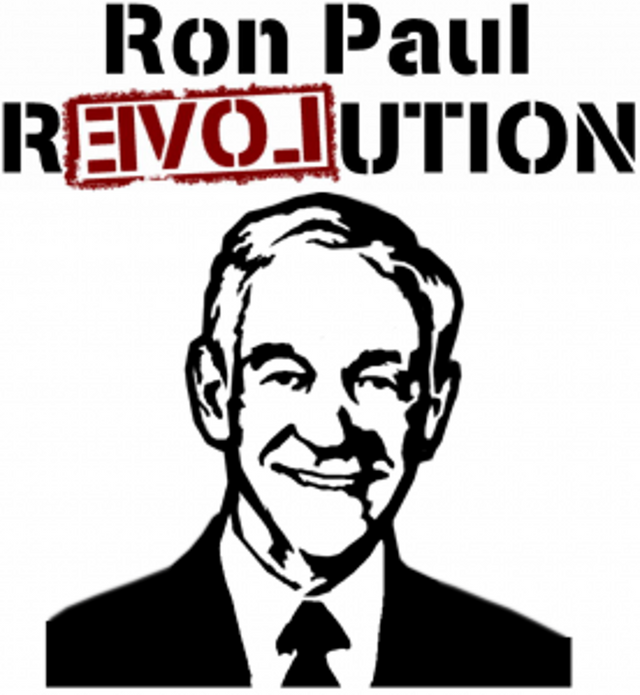
The whole Trump phenomenon has normalized the Alt-Right, making the fringe elements of the right more mainstream. The Republican Party is now unrecognizable when compared to the Republican Party of Ronald Reagan and George H. W. Bush. By nominating Trump, the Republican Party allowed right-wing extremists to feel more comfortable inside the party. Reagan and Bush, for instance, did not reject climate science and would step across party lines to cooperate with the opposing party when they felt it was in the best interests of the American people. By the time Obama was elected, there was no possibility of bipartisanship; the Republican Party had become hellbent on opposing anything that the Democrats supported. When Democrats set aside their aspirations for single-payer healthcare and proposed a market-based healthcare reform bill called the Affordable Care Act, Republicans rejected it and fought against it tooth and nail, in spite of the fact that it was entirely based upon Republican proposals! When Democrats got behind Republican plans, Republicans rejected their own plans for the sake of demonizing Democrats. The Republicans began to identify themselves more as standing against anything and everything that Democrats support rather than identifying with any positive position. Reagan and Bush had a positive vision and set of values that they supported, whereas modern Republicans are just defined by their opposition to the Democratic Party. As Republicans just became anti-Democrat, their positive ideological foundation eroded. This lack of any positive philosophy or ideology in modern Republicanism made room for extremists.
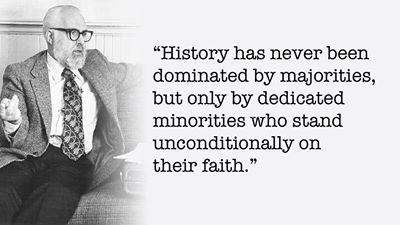
This was already a long time coming. The fringe right had been infiltrating the Republican Party for a while. Ron Paul, a Rothbardian, ran for president as a Republican in 2008, sparking the "Ron Paul Revolution" and inspiring the Tea Party movement. Ron Paul is the "father of the Tea Party movement." While I disagree with Ron Paul on a lot of things, I do respect the man. The problem with the Ron Paul Revolution was that it allowed the fringe elements of the right to find their way into the Republican Party. Anarcho-capitalists could sympathize with Ron Paul's Rothbardian message, even if he avoided the term "anarcho-capitalism." Judge Andrew Napolitano—who also identifies as Rothbardian but doesn't call himself "anarcho-capitalist"—got a gig on Fox News Radio in 2006. Napolitano frequently had figures like Lew Rockwell on his show. Napolitano is frequently featured on Fox News programs. Such figures as Ron Paul and Andrew Napolitano made anarcho-capitalists feel like they had a place in the mainstream conservative movement and in the Republican Party. But other people like Rick Perry, Michelle Bachmann, Mike Huckabee, and Sarah Palin, also made room for another radical fringe. Perry, Bachmann, Huckabee, and Palin are to dominionism and theonomy what Ron Paul was to anarcho-capitalism. These populist candidates were sympathetic to the cause of re-instituting biblical law, making hardcore reconstructionists and fundamentalists feel more comfortable in the Republican Party. For a long time, people like Jerry Falwell and Francis Schaeffer had been building up the religious right and trying to normalize Christian fundamentalism.
Conservatives like William F. Buckley Jr. had worked hard to remove overt racism from the conservative movement and helped to push openly racist people out of the Republican Party. White supremacists, religious extremists, and radical fringe movements of the right just didn't fit in. Members of such movements couldn't feel comfortable in the Republican Party. Folks that read books by R. J. Rushdoony—a fundamentalist who advocated making biblical law the law of the land, opposed interracial marriage, and thought that Southern slavery was a benevolent institution—didn't feel like they had a place in the Republican Party. When Michelle Bachmann cited Francis Schaeffer's How Should We Then Live? as her inspiration behind getting into politics, it signaled to the fringe fundamentalist Christians that they now had a place in the Republican Party. (Schaeffer had promoted some of Rushdoony's works.) When Ron Paul talked about Murray Rothbard—a man who defended the Confederate cause and endorsed David Duke—as a major influence on his political ideas, it signaled to anarcho-capitalists that they now had a place in the Republican Party. There is a long and tangled history of racism in both anarcho-capitalist and Christian fundamentalist circles, and bringing these alternative right-wing ideologies into the Republican fold was impossible to do without bringing in tons of racists and fascists as well.
The Republican Party has been taken over by members of various far-right fringe movements. It is no longer the Republican Party of Ronald Reagan, William F. Buckley Jr., Barry Goldwater, and George H. W. Bush. That Republican Party would never have nominated Donald Trump. The Republican Party of Ronald Reagan is dead.
great article, heavy stuff lolz!
Smart article by @ekklesiagora
I think ur political knowledge is execellent sir...I'm always resprct to ur ideas...
Such a wonderful article...
Wel done and perfect work sir...
yeap I agree with you the days of Milton Freidman are truly over ekkesiagora thank you
With love,
harj : ) xoxo
Abstract artist
(My latest artwork is "Government")
@ekklesiagora, Absolutely I don't like to talk about political field. But this letter very interesting. I completely read now. You nicely contributed these topic use some examples. Sadness story indeed. Thanks to the effort.
@ekklesiagora sir...
Actualy interesting topic for post...actualy I can't trust political feild...
World Politic feild like game now....
I agree with you. it is great article and great work.thanks for sharing
Thanks @ekklesiagora
Have a great day
Though I have not much interest in history and politics, it always irritates me. But for now, I must say, this is the worth reading story about democratic parties. You've written both parties comparison very well. What's your personal opinion about which party does best Republican Party of Ronald Reagan OR Donald Trump?
Have a good Day!
That is wonderful post sir. it is very interesting and great writing experience.
@ekklesiagora
100% like and resteem
Excellent story about democratic problem (political subject) with racism indeed. Perfectly compared both parties. Nice to reading it. I studied political subjects before and interesting to reading that.
I totly agree with you, that Republican Party of Ronald Reagan, would never nominative donal trump party.